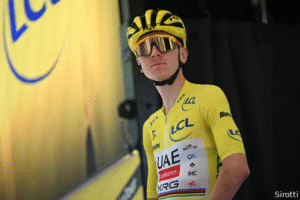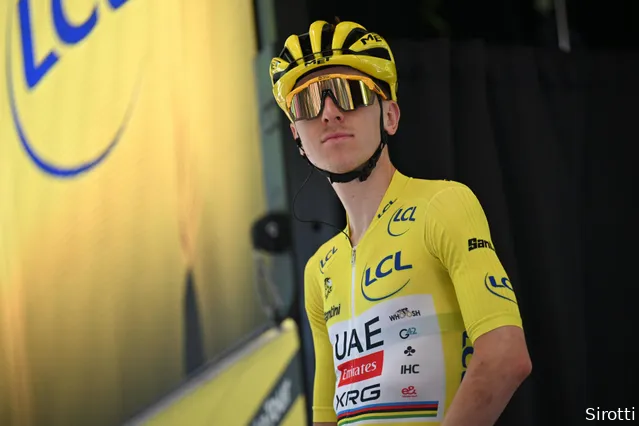**Pogacar Speaks Out: “Some People Would Be Better Off Keeping Their Mouths Shut Sometimes”**
In the world of professional cycling, few athletes have garnered as much attention and admiration as Tadej Pogacar. The Slovenian phenom, known for his exceptional climbing ability, strategic prowess, and charismatic personality, has become one of the sport’s most prominent figures. However, with fame often comes scrutiny, controversy, and the inevitable spotlight on both performance and personality.
Recently, Pogacar took to the media to address some of the criticism and comments circulating within the cycling community and beyond. In a candid interview, he expressed his frustration with certain individuals whose remarks he believes are unhelpful or unnecessary. His statement, “Some people would be better off keeping their mouths shut sometimes,” resonated widely within the cycling world and beyond, sparking conversations about athlete conduct, media responsibility, and the importance of respectful discourse.

To understand the significance of Pogacar’s comments, it’s essential to consider the context in which he spoke out. Over the past year, the cycling community has been rife with debate over race tactics, doping allegations, team dynamics, and the role of media commentary. While healthy discussion is vital for the sport’s integrity and growth, there has been a noticeable increase in inflammatory or baseless accusations.
Pogacar, who has often been regarded as a role model both on and off the bike, was reportedly responding to specific criticisms or comments made by rival cyclists, commentators, or social media users. The frustration appears to stem from what he perceives as unwarranted negativity or gossip that distracts from the sport’s true essence — competition, dedication, and sportsmanship.
The criticisms Pogacar alludes to vary in nature. Some involve tactical decisions made during races, with pundits and fans second-guessing his moves or questioning his motivations. Others relate to team strategies or off-the-bike behavior, which sometimes become sensationalized in the pursuit of clicks and ratings.
In recent months, certain rival athletes have made statements implying that Pogacar’s success is due to unfair advantages or that he relies heavily on team support. Meanwhile, social media has amplified rumors and conspiracy theories, creating a toxic environment that can be difficult for athletes to navigate.
Pogacar’s outburst also highlights a broader issue within professional sports — the mental toll of relentless scrutiny. Athletes today are under intense pressure to perform, maintain a spotless image, and manage their public persona. Negative comments, whether justified or not, can accumulate and impact mental health.
By saying that some people would be better off keeping their mouths shut, Pogacar emphasizes the importance of restraint and respect. His words serve as a reminder that constructive criticism is valuable, but unwarranted attacks or gossip serve no purpose other than fueling negativity and distracting from the sport’s true spirit.
Media outlets and fans play a significant role in shaping the narrative around athletes. Responsible journalism and respectful fandom are crucial for fostering a healthy sporting environment. Pogacar’s comments act as a call for maturity among all parties involved.
While media outlets have a duty to report accurately and critically, they also bear responsibility for avoiding sensationalism. Fans, on the other hand, should promote positive engagement and refrain from personal attacks or spreading misinformation.
Despite some criticism of his comments as being confrontational, many fans and fellow athletes have expressed support for Pogacar’s stance. His willingness to speak openly about the need for civility demonstrates leadership and maturity, qualities that resonate with many in the cycling community.
Moreover, his comments serve as a catalyst for discussions about the culture within professional cycling and sports in general. They challenge everyone involved to reflect on how they communicate and the importance of maintaining respect, even amid fierce competition.
Pogacar’s outspoken stance underscores a growing movement within sports to promote integrity, respect, and mental well-being. Athletes like Pogacar who speak out against toxicity help set a precedent for others to follow.
Furthermore, his comments highlight the need for a balanced approach to criticism. While athletes expect honesty and accountability, they also deserve a respectful environment that fosters growth and positivity.
A Call for Respect and Discretion
Tadej Pogacar’s recent remarks serve as a reminder that sometimes, silence is golden. In a world where social media and instant news can amplify even minor comments into major controversies, exercising discretion and respect is more important than ever.
As Pogacar continues his career at the highest levels of competition, his stance encourages fans, commentators, and fellow athletes to reflect on how they communicate. By choosing words wisely and fostering an atmosphere of mutual respect, the sport of cycling — and all sports — can thrive in a healthier, more positive environment.



